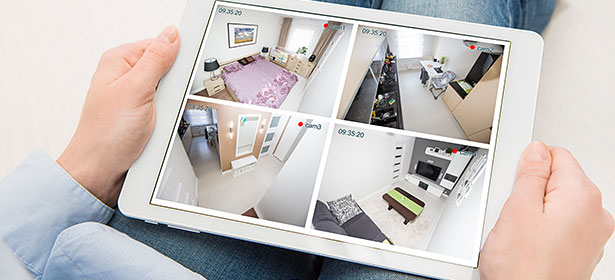Top rated
Top rated
- best buy
- Ease of use
- Alarm sensitivity
Full Access first month £5, then £10.99 per month, cancel at any time
By clicking a retailer link you consent to third party cookies that track your onward journey. If you make a purchase, Which? will receive an affiliate commission which supports our mission to be the UK's consumer champion.

In this article
Smart home security systems combine many of the features of a traditional burglar alarm with the ability to monitor, control and interact with your alarm from an app on your smartphone or tablet.
So is this technology worth investing in? Read on to find out more about smart home security systems and whether a smart alarm from brands such as Ring and ERA is right for your home.
Alternatively, head straight to our expert reviews of burglar alarms and smart security systems
Full Access first month £5, then £10.99 per month, cancel at any time
Full Access first month £5, then £10.99 per month, cancel at any time
Full Access first month £5, then £10.99 per month, cancel at any time
A smart home security system is a set of internet-connected security gadgets, which typically include a combination of a hub, siren, motion detectors and contact sensors that detect when an intruder is trying to get into your property.
Some alarm systems also sync up with other smart gadgets, such as wireless security cameras, smart locks and voice controlled devices, such as an Amazon Echo.
Most alarm brands offer a range of bundles so it is worth shopping around for the best value option.
All smart home security systems are driven by a central internet-connected ‘hub’, which wirelessly connects to and communicates with an app and the other components of the system.
Using the app on your smartphone or tablet, you can monitor your home by receiving alerts when the alarm is triggered and then you can take action, such as calling the police.
Some supposedly smart alarm systems are actually just wireless cameras with extra functionality. These can be useful for keeping a visual eye on your home, but they can't compete with a dedicated alarm system.
Basic smart home security system kits can be bought for under £100, but Best Buy systems typically cost more, starting at over £200.
It's also worth considering what you get in the standard kit - it's usually just one motion detector and one window/door contact sensor, which won't be enough for any property bigger than a small flat.
Do consider what you'll need to effectively cover your property. Additional motion detectors and contact sensors typically can cost around £25 each, so the costs can rack up for larger homes.
You might also want to add extra smart home devices if they are compatible, such as wireless security cameras. We have got Best Buy cameras that can be combined with Best Buy smart alarm systems for the ultimate package.


If you want convenience and flexibility, a smart alarm system takes some beating. They let you keep an eye on your home via an app on your phone, so you always have access to your home security wherever you go.
Most smart alarms we've tested will work effectively if your wi-fi goes down. You won't get notifications, but the alarm will still trigger if a sensor is breached.
However, we have tested one that doesn't work at all without an internet connection, and that is a concern if your home broadband isn't very reliable.
Here, a traditional alarm, such as a 'bells-only' system, does have the edge. They typically have more limited functionality and convenience compared to smart alarms, but they are more reliable.
Plus, you can go for a system with a monitoring contract in which a company responds if the alarm is triggered. This can give more peace of mind over a smart alarm system that you manage yourself.
You can browse fully tested bells-only and smart alarm systems in our Burglar alarm reviews. We have systems to meet all budgets and needs.
Alternatively, see how alarm brands, including those that offered monitoring contracts, are rated by real customers in our best alarm brands guide.

Self-installation is a big selling-point of smart home security alarms, as most systems can be fitted in your home with even basic DIY skills.
If the system has an external sounder box (many don't come as standard), then the trickiest job is fitting this to the outside of your home.
After that, though, it is just a matter of installing the motion detectors in the most important parts of your home (such as over a back door) and the contact sensors on doors or windows.
There are some things to bear in mind when installing your alarm system:

If you're installing a smart alarm on your property, it's not just physical intrusions you'll want protection from. As with any smart device that connects to the internet, cyberthreats are also a consideration. Security updates allow companies to ensure your alarm system is always up to date with the latest protections. Nobody wants an alarm system that leaves the door open to hackers.
In order for you to make the best choices, we ask all brands behind smart alarms that we test how long they will support their device with updates.
We contacted a range of other brands, including Netatmo and Bosch, but none of them committed to a number of years for support.
Hive has said that it will end support for the the Hive Homeshield smart burglar alarm (including sirens, keypads and sensors), along with the Hive View indoor camera and Hive View Outdoor camera, on 1 August 2025.
If an alarm you own is no longer supported it won't immediately be hacked, but the risk goes up and with a security-focused device, it's a risk not worth taking. So, if the alarm is no longer supported, you should consider upgrading to a new one when you can. For more information on updates, read our guide to smart devices and security.
Any smart product that connects to the internet can in theory be targeted by hackers if it does not have effective security protections. Likewise, if your data isn't properly handled it could pose a risk to your privacy.
We run all smart alarm systems through a barrage of tests for whether they have been built with your security and privacy in mind.
We cover in our reviews if we have found any concerns. We can hold back Best Buys for any serious issues uncovered, and even automatically Don't Buy a product if the issue is high risk and the manufacturer has not committed to fix it or take action.
Any products with security issues can be easily identified via the 'security alert' banners in our reviews.